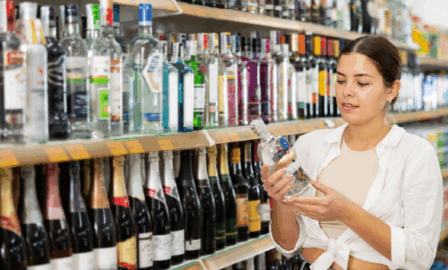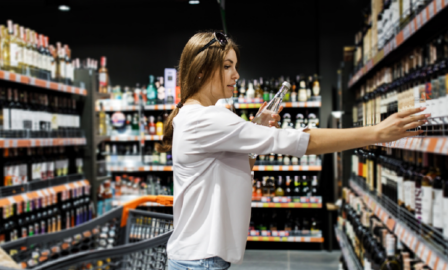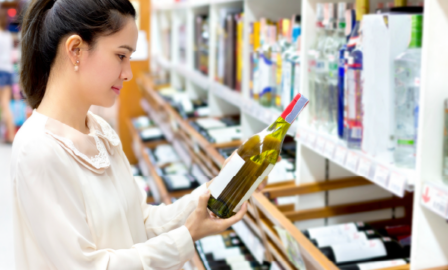AI in Wine & Spirits: Use Cases in Taste, Packaging, and Operations
Consumer beverage preferences are rapidly changing, and while humans might be slower to catch the new fad, artificial intelligence (AI) is frequently searching the internet and social media sites for the drink of the season. As the use of AI in the wine & spirits industry is still relatively new, the main areas we’re seeing it leveraged are in new product formulation and marketing activities. Additionally, it’s not a technology only utilized by large brands – AI can also be used by start-ups and growing companies, as it’s a solution that doesn’t require custom tools and applications.
Keeping up with Consumer Trends
With the evolving demands of consumers, AI is keeping small and large wine & spirits brands ready for action – whether that’s through taste, packaging, marketing, or operations. AI can support the full lifecycle of alcohol and beverage processes; say a certain product may be marketed to shoppers through AI – it can also be correctly manufactured and delivered with the help of AI technology. It’s a multi-faceted and off-the-shelf solution keeping up with the fast-moving pace of the wine & spirits industry by refining taste profiles, marketing campaigns, and strategy and operational processes.
AI is advancing the wine & spirits industry in many areas with its capabilities of processing data faster than the human eye. While we know AI is better at streamlining operations, enabling beverage companies to cut down on overhead costs through more efficient and technology-enhanced processes, it’s also taking on more creative forms by aiding in marketing campaigns and packaging design and even crafting the perfect cocktail for consumers.
AI in Wine & Spirits Industry
Below are examples of the strategic use of AI in the wine & spirits industry:
Taste
UK-based distiller Circumstance Distillery partnered with tech firms Rewrote Digital and Tiny Giant to develop and train an AI program, named Ginette, on thousands of botanicals and gin recipes in order to create the first ever AI-created gin, named Monker’s Garkel. Ginette’s ability to analyze large datasets and create a new and innovative recipe demonstrates the true opportunity that exists in AI product development.
In another instance, an experiment was done by a group of Belgian scientists where they trained AI to be essentially a “beer taster.” With this, they improved the beer’s taste with model predictions and tested its quality with AI to see how it would be perceived by drinkers. The results of the experiment were “modified beer scored better than the original in blind tastings,” showing us its capabilities to improve taste.
Packaging
Whiskey brand Glenlivet launched “The Twelve Elements,” an ultra-rare and lavish whiskey collection, which used AI-generated artwork on its packaging design. Glenlivet is a brand that is generally known for its traditional and old-school whiskey as the oldest distillery in Scotland, yet it used AI as an acknowledgment to the future of technology. By using AI, the brand was able to capture creative and unique packaging even for upscale and traditional liquor brands.
Similarly, startup AI company Vizit has also championed packaging design by applying its AI algorithms to alcohol brands on Target’s website. The technology simulates human visual preferences and ranks image effectiveness. With its insights, brands can see how their packaging is performing with consumers.
Operations
While we see AI in its creative form, it also helps wine & spirits organizations across their strategy and operations. It can assist with inventory, efficiency, quality control, and more.
A smaller alcohol brand called Dairy Distillery, which produces Vodkow cream liquor, partnered with AI expert, Pleora, to help refine their AI processes. They used a camera-based application called Vaira, which has a suite of solutions that include visual inspection processes. With these new visual capabilities, Vodkow was better able to manage quality control of bottle production. Bottles with errors exiting the factory machinery were caught by this AI technology, rather than slipping through the cracks of human oversight.
In another case, major beer brand Heineken partnered with Stravito, an AI platform assistant that allows food and beverage companies to have better access to consumer insights. Heineken reported having “unstructured data” previous to the implementation. However, now it has a better understanding of consumer insights which can support the organization operationally and with its marketing approach.
Looking Ahead
Whether your wine & spirits organization is searching for guidance operationally or creatively, AI is a great tool for both. The impact of AI in the wine & spirits industry is just beginning, as AI is an accessible tool used for both large and small operations. It doesn’t require expensive tools and intricate moving parts, but rather a strategic plan for putting it to use. To continue the conversation, get in touch with our experts in AI and wine/spirits today.
Subscribe to Clarkston's Insights
Contributions from Leah Harding



